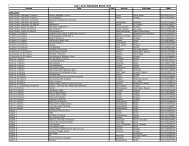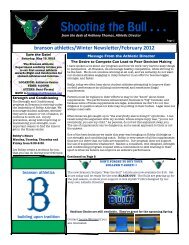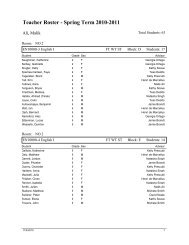Farewell
branson magazine - The Branson School
branson magazine - The Branson School
Create successful ePaper yourself
Turn your PDF publications into a flip-book with our unique Google optimized e-Paper software.
THE SCOTT HAMILTON CHASE FELLOWSHIP<br />
The Chase Fellowship pays tribute to Scott Chase’s life,<br />
his sense of adventure and inquisitive attitude. The Chase<br />
Fellowship seeks to foster intellectual and cultural growth<br />
and awareness in a student during the summer between<br />
the junior and senior years. The Fellowship has been made<br />
possible by the generosity of the Chase family and by<br />
Scott’s classmates in the Class of 1985.<br />
Scott Hamilton Chase<br />
Fellowship<br />
With the support of the<br />
Chase Fellowship, I was lucky<br />
enough to travel to rural Nicaragua<br />
where I started a new<br />
sports and tutoring program<br />
for a non-profit, Viviendas<br />
Léon. Before my trip, I earned<br />
an “F” soccer coaching license<br />
and a certificate in Teaching<br />
English as a Foreign Language.<br />
During my three weeks in<br />
Goyena, Las Pampas and Nueva Vida, I organized sports camps,<br />
initiated a new tutoring program, and helped build a school<br />
and community center.<br />
The hardest challenge I faced was building a connection<br />
with the community in which I attempted to sustain a reciprocal<br />
relationship. If I didn’t strive to associate with people,<br />
I feared the inherent inequality between the giver and taker<br />
would strip one of us of our dignity. To demonstrate that I was<br />
also there to learn from them, I became their teammate and<br />
peer instead of their coach and teacher. As the kids began to include<br />
me in their banter by teasing me about being a “gringa,”<br />
and the adults began to follow their children to the soccer field<br />
and classroom with shy hints of smiles on their faces, I knew<br />
that they had begun to accept me. I was in the process of gaining<br />
the community’s trust. I learned as many valuable, timeless<br />
lessons from the community as they learned from me.<br />
The Nicaraguan community showed me how to appreciate<br />
the simplicity of life and value relationships built on mutual<br />
respect, while reminding me that to have a positive impact, I<br />
need the hands-on experience of working in the complexity of<br />
the world. Knowing that the program continues to succeed, I<br />
am inspired to continue to empower others through sports and<br />
learning.<br />
Kyra Deeth Stehlin ’12<br />
Reid Mangels Fellowship<br />
Because of the generosity of the Mangels family, last summer,<br />
I had the opportunity to expand my passion for biological sciences:<br />
I interned at the local marine biology lab, the Romberg<br />
Tiburon Center (RTC), and traveled to Atenas, Costa Rica, to<br />
study applied research techniques and sustainability. For the<br />
first three weeks of summer, I assisted graduate students at RTC<br />
with their studies of the populations of copepods in the San<br />
Francisco Bay, and examined how the changes in their numbers<br />
may be affecting the decline of the Delta Smelt during<br />
their larval stages.<br />
For the next part of my Fellowship, I lived and studied<br />
at the Center for Sustainable Studies in Costa Rica.<br />
Taking advantage of the incredible biodiversity of tropical<br />
rainforests, we studied in remote field stations. During<br />
the second week, I chose to study fungi, specifically<br />
ectomycorrhizal mushrooms. Ectomycorrhizae refers to the<br />
symbiotic and mutualistic relationship between fungi and<br />
flora. Both species benefit, the mushrooms provide water,<br />
and the trees or plants provide nutrients. I never imagined<br />
myself studying mushrooms instead of animal species, and<br />
I was pleasantly surprised by how inspiring<br />
and captivating I found the work.<br />
Limited work has been published<br />
about ectomycorrhizae, so there is still<br />
much to learn. It was really exciting<br />
when we were able to draw some conclusions<br />
connecting forest productivity to<br />
the mycorrhizae, and I wrote my paper,<br />
“Mycorrhizal Mushrooms: Do larger<br />
hymeneal surfaces allude to greater forest<br />
fitness?”<br />
The experience gave me self-confidence, the opportunity to<br />
leave the country, and the privilege of studying with college<br />
students on a subject matter about which I knew very little. I<br />
now have a sense of what it is like to be a field biologist, how<br />
to analyze data through statistics, and how to write a research<br />
report. I learned the most about myself by being in a different<br />
and sometimes challenging situation. The time during my<br />
fellowship helped me not only discover more about myself as a<br />
person, but determine what I am truly passionate about. After<br />
taking classes on the history and economics of Costa Rica, I feel<br />
more inspired to study environmental policy, so that I can help<br />
to aid the conservation of the environment that I experienced in<br />
my travels.<br />
Alexa Boesel ’12<br />
4 BRANSON SPRING 2012






